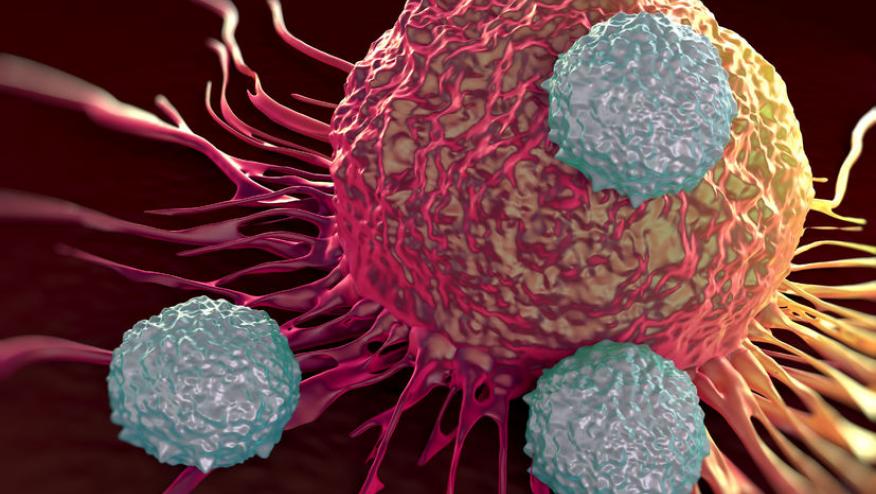With Autoimmunity, Checkpoint Inhibitors Can Be Used Save

Among patients with pre-existing autoimmune diseases who developed cancer and were treated with immune checkpoint inhibitors (ICI), flares of the underlying disease and other immune-related adverse events were common, a retrospective study conducted in France showed.
During a median follow-up of 8 months, 71% of 112 patients with autoimmune disease receiving checkpoint inhibitor treatment for cancer reported some type of immune toxicity, according to Divi Cornec, MD, PhD, of Hôpital de la Cavale Blanche in Brest, and colleagues.
A total of 47% of patients experienced a flare of the underlying autoimmune disease, 42% had an immune-related adverse event that was unrelated to their autoimmune disease, and 18% noted having both types of events, the researchers reported in Arthritis & Rheumatology.
They observed that these events were "mostly manageable without ICI discontinuation," usually with glucocorticoids, although worse outcomes were seen among patients who were on immunosuppressive therapy when starting ICI treatment.
In an accompanying editorial, Lenore M. Buckley, MD, of Yale School of Medicine in New Haven, Connecticut, and Maria E. Suarez-Almazor, MD, PhD, of the University of Texas MD Anderson Cancer Center in Houston, wrote, "This study adds to the growing evidence that although ICIs may increase the occurrence of flares and other immune-related adverse events in patients with prior autoimmune conditions, these manifestations can be appropriately treated in most cases."
ICIs are rapidly becoming a standard of care in many cancers, and while inhibiting immune checkpoints can increase the immune response against tumors, ICIs can also interfere with self-tolerance and lead to immune-related or inflammatory adverse events. These events have been observed in up to 70% of monoclonal antibodies targeting programmed cell death 1 (PD-1) and 90% of agents targeting cytotoxic T-lymphocyte-associated protein 4 (CTLA-4).
Most patients with pre-existing autoimmune diseases have been excluded from clinical trials, so safety and efficacy in these groups has been uncertain. Moreover, the effects of immune-related adverse events and immunosuppressive therapy on clinical response have not been determined.
Therefore, Cornec's group conducted a retrospective study of patients enrolled in three French national cancer and rheumatology databases from 2017 to 2018. Of the 112 patients included, 66 had melanoma, 40 had non-small cell lung cancer, four had urologic cancers, and two had Merkel cell carcinoma.
The most common underlying autoimmune diseases were psoriasis/psoriatic arthritis in 28% of the patients, rheumatoid arthritis in 18%, and inflammatory bowel disease in 13%. The median duration of disease at the time of ICI initiation was 12 years, and the median duration of cancer was 20 months.
The ICI treatment was permanently discontinued in 21% of patients because of immune toxicity even though most were given immunosuppressive therapy to manage the event. One patient died of a potentially related immune toxicity (liver failure with primary biliary cirrhosis).
Among patients whose toxicity was considered a flare of the underlying disease, 30% of the events were severe. In 86%, glucocorticoids were given to treat the flare in dosages ranging from below 15 mg/day to 1-2 mg/kg/day, 21% were given a conventional disease-modifying anti-rheumatic drug (DMARD), and 11% received a tumor necrosis factor (TNF) inhibitor.
Eight of those patients were on an immunosuppressive therapy at the time of ICI initiation, either low-dose corticosteroids or a conventional DMARD.
For patients whose ICI-associated immune toxicity was unrelated to their underlying autoimmune disease, the adverse event was severe in 40%.
These adverse events tended to occur more frequently with exposure to the CTLA-4 monoclonal antibody ipilimumab (Yervoy) than with the anti-PD-1/PD-L1 agents given alone.
The events reported most often with ipilimumab included colitis and hypophysitis, whereas patients receiving the anti-PD-1/PDL-L1 agents most often reported vitiligo, colitis, arthralgia/arthritis, and thyroiditis.
Immunosuppressive treatments were given to 53% of patients with immune-related toxicity unrelated to their autoimmune disease, with all of these receiving glucocorticoids and four also being given agents such as methotrexate or TNF inhibitors.
When the researchers looked at tumor response and survival, they found that 49% of patients had either partial or complete responses to the first-line ICI treatment, with median progression-free survival being 12.9 months in those with melanoma and 11.8 months in those with non-small cell lung cancer.
In a univariate analysis, treatment with an immunosuppressive at baseline was associated with a shorter progression-free survival (3.8 vs 12 months, P=0.006), and in a multivariable model, baseline immunosuppressive use again was associated with shorter progression-free survival, with a hazard ratio of 2.10 (95% CI 1.08-4.07, P=0.028). The occurrence of a flare or immune adverse event also was associated with a shorter progression-free survival (HR 1.97, 95% CI 1.06-3.66).
Buckley and Suarez-Almazor noted that in their experience, many patients who develop immune toxicities and who receive low-dose glucocorticoids or DMARDs are able to continue ICI treatment and maintain a good response. "Nevertheless, the longer-term impact of immunosuppression on the efficacy of ICIs and tumor progression is uncertain. It will likely vary with the mechanism of action of the immunosuppressive agent and the dose, duration, and timing of use, but there is little robust evidence from this or other studies to guide decision-making and establish best practices."
Further research is "sorely needed" to identify patients at risk for these adverse events "and to adequately establish therapeutic protocols that maximize patient outcomes while decreasing potentially deleterious effects on cancer progression," Buckley and Suarez-Almazor concluded.
A limitation of the study, the researchers said, was its retrospective design.
The authors reported financial relationships with Bristol-Myers Squibb, Merck Sharp & Dohme, Roche, Novartis, Debiopharm, Regeneron, Medimmune, Pierre Fabre, AstraZeneca, Janssen, Astellas, Sanofi, LFB, CSL Behring, Incyte, Boehringer Ingelheim, Chugai, Takeda, Merrimack Pharmaceuticals, Pfizer, and Merck-Serono.










If you are a health practitioner, you may Login/Register to comment.
Due to the nature of these comment forums, only health practitioners are allowed to comment at this time.